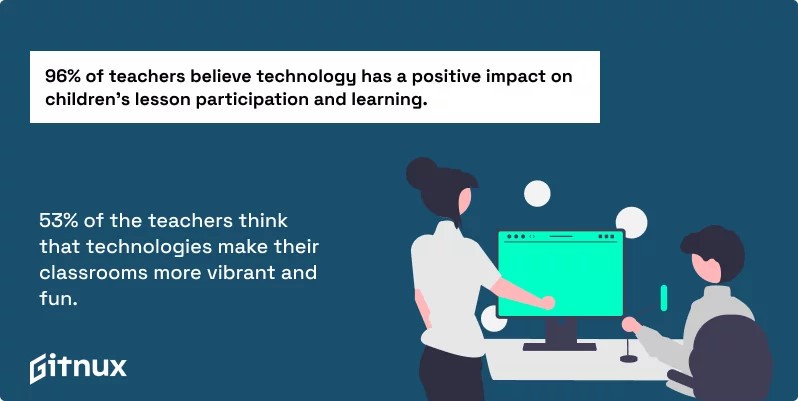
Gone were those days when the orthodox way of teaching and learning was the only option. Nowadays, we live in a digital era where we are witnessing technology is revolutionizing every sector even the education sector.
The use of the latest modern technology especially in special education schools has made the learning content easier for those special needs students who have a tough time in general to pursue their education. According to gitnux.com, 96% of teachers believe that it improves the student's participation in the learning process.

In this blog post, we have picked some of the best technological trends with which every special needs teacher can create an inclusive and engaging learning environment for special education needs (SEN) students.
Before moving to the topic, can we ask you a question? Do you follow us on Social Media? We regularly share upgraded educational content, tips, feedback, and more. Check us out by clicking the profiles here – Facebook / Twitter / LinkedIn / Pinterest / Instagram / YouTube
So, without any further delay, let’s get started.
5 Benefits Of Utilizing Latest Technology Trends Within Special Education Field
1. Utilization of Virtual Reality and Augmented Reality
Virtual Reality (VR) and Augmented Reality (AR) hold significant potential in the field of special education. These groundbreaking technologies offer a virtual environment where children with special needs can actively engage in honing their motor skills. To illustrate, autistic children who struggle with navigating crowded spaces or enduring long waits can greatly benefit from immersive VR environments that simulate real-life scenarios. By practicing these situations within a virtual setting, they can enhance their comfort level and readiness when facing similar challenges in the physical world.
Furthermore, the utilization of virtual reality technology enables the creation of a simulated environment that fosters mindfulness and promotes awareness. Specifically, children with special needs can engage in activities where they manipulate objects in ways that surpass real-world limitations. This interactive experience greatly contributes to the enhancement of their cognitive and motor skills. It also provides them with a unique opportunity to be present and engaged in their learning process.
2. Artificial Intelligence for Early Screening
Artificial intelligence (AI) has made significant advancements in the field of special education. Several companies have developed AI-powered tools that help identify learning disabilities and delays in development at an early stage. For instance, Amplify's mCLASS tool uses AI to assess children's reading skills and identify dyslexia. Similarly, Babynoggin has developed a mobile app that utilizes AI to screen children for delayed development in various areas, including motor skills, social-emotional abilities, cognitive processing, and language skills.
While these AI-powered tools can efficiently screen children for potential learning disorders, it is important to note that only trained professionals can diagnose specific needs. Direct interaction and assessment are still essential for accurate diagnosis and personalized intervention.
3. Personalization Education
Personalization is a growing trend in education, and it holds significant promise for special needs children. Personalized learning allows students to customize their learning experience based on their individual needs and preferences. This customization can be especially beneficial for special needs children, as it eliminates the need for them to repeatedly modify different profiles and settings to accommodate their requirements.
Technology companies like Google have been instrumental in advancing personalized learning through their web-based Chromebook devices and G-Suite productivity tools. These tools offer various features, such as "select-to-speak," that allow students with special needs to have text read back to them. This is especially beneficial for braille readers.
Additionally, these tools provide document editing, word prediction, and translation capabilities that can be linked to individual user accounts. This ensures consistent accessibility settings across multiple devices.
What Can You Do With Our Master of Arts in Education with Teaching Technology Degree?
4. Computer Science Accessibility for All SEN Students
Several organizations have joined forces to promote inclusive computer science education by ensuring that students with special needs have equal access to learning opportunities in this field.
One such initiative is led by Bootstrap, a company that has developed a computer science curricular module for math and physics classes. Their goals include making their platform more user-friendly for students who cannot use a computer mouse, incorporating screen reader capabilities, and creating a toolkit function that integrates with different programming languages to enhance accessibility.
By making computer science education accessible to all, special needs students can develop essential skills and pursue careers in this rapidly evolving field.
5. Making "Open Educational Resources (OER)" More Accessible
The concept of "open" technology resources has gained traction in special education. Open educational resources (OER) are freely available resources that can be used and modified without restrictions. While many schools have embraced the use of OER, there is still room for improvement in terms of accessibility and customization for special needs students.
For instance, PDF files, although widely used, have limitations when it comes to accessibility for special needs students. They may not work well with screen readers, have limited searchability, and lack customization options. However, there is a growing trend towards making "open" resources more inclusive and friendly for special education students. Efforts are being made to develop platforms and tools that address these limitations and provide a more accessible learning experience for all students.
Embrace and Integrate Latest Technology Within Your Special Education class
Technology has revolutionized every industry, especially the education sector. The utilization of the latest technological teaching method can improve the learning experiences of every special needs student a lot, as technology has the power to cater the different needs of SEN students. Those teachers who have pursued courses like Online Special Education Courses, knows really well how to utilize the latest technology for the benefit of their special need students.
Furthermore, every special needs teacher can embrace the above-mentioned technology trends and create an inclusive learning environment that empowers special needs children and helps them reach their full potential.
We believe education should be accessible for everyone. That’s why we don’t charge for our blogs. Find the right course that will help you in your career with us, contact us at - 6292150868. You can mail us at act@asiancollegeofteachers.com
Get In Touch
UK – Registered OfficeAsian College Of Teachers Ltd (UK)
27, Old Gloucester Street, London – WC1N 3AX, UK
UK Toll Free:Â 0-808-189-1203
www.asiancollegeofteachers.co.uk
All SEN Courses are designed, developed and created by Asian College of Teachers Ltd, United Kingdom. These courses are certified by CPD Certification Service UK and endorsed by NCC Education, UK, and Short Courses from CACHE, UK through Laser Learning UK.
Asian College of Teachers (ACT) undertakes a continuous review of its teacher training courses to ensure imparting high quality education. However, there might be circumstances outside of ACT’s control which might affect its stakeholders like if you are planning to teach in a different country, applying for a teaching license, pursuing higher studies or trying to get the certificate approved by the Ministry of Education (MoE) of a particular country then you can do so with the certificate issued by Asian College of Teachers (ACT). However, each country’s Ministry of Education (MoE) or educational bodies set certain standards that are indispensable for the pursuit of higher studies or teaching in schools in that country. So it can be a possibility that you may be able to use the certificate for higher studies or teaching purposes in one country and not in another. Therefore, we strongly recommend that you investigate thoroughly and check with the relevant authorities regarding the acceptance of the certificate issued by us before you enrol on a particular course. ACT strives to offer high-quality education and its certificates can be valuable for various purposes internationally, but still it is crucial for individuals to verify the specific recognition of the certificate in the country they intend to use it, especially for formal education or professional licensing purposes. This approach ensures that the stakeholders make informed decisions regarding their educational and career paths.
© 2026 Asian College of Teachers. All Rights Reserved. Asian College Of Teachers is a trading brand of TTA Training Pvt. Ltd (India) - CIN U80902WB2016PTC215839, Asia Teachers Training Co., Ltd (Thailand) - Registration No. 0105558193360, Asian College Of Teachers Ltd (UK) - Company Number 9939942 & Asian College Of Teachers LLC, (USA) - Federal Tax Identification Number 30-1261596
Designed by kreativewebtech